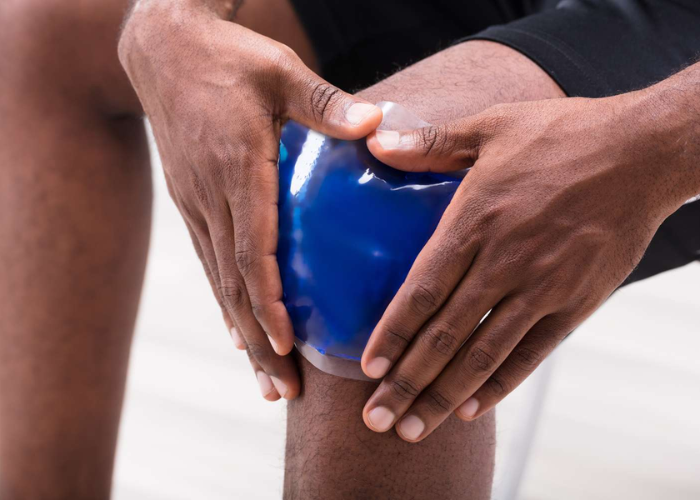Knee pain is a common problem many people suffer from, and various factors can cause it. But no matter the cause, it can be a debilitating condition that affects your ability to move comfortably and efficiently. Fortunately, there are a variety of home remedies you can use to get relief from knee pain. Several ways to reduce knee pain exist, from simple lifestyle changes to natural treatments and therapies.
Causes of Knee Pain
Knee pain is a common issue that affects millions of people. It can be caused by various factors, ranging from sports injuries to medical conditions. Some of the most common causes of knee pain include arthritis, tendonitis, bursitis, and patellar tendonitis.
Arthritis is an inflammatory joint disorder that causes pain, swelling, stiffness, and limited motion in the affected area. Tendonitis is an overuse injury that causes pain and swelling in the tendons that attach muscles to bones.
Bursitis is an inflammation of the bursa, a small fluid-filled sac that cushions between bones and soft tissues. Patellar tendonitis is an inflammation that connects the kneecap to the shin bone. In addition to these conditions, knee pain can also be caused by meniscus tears, gout, and muscle strains.
Symptoms of Knee Pain
Knee pain is one of the most common complaints among people of all ages. Symptoms of knee pain can range from mild to severe and can be caused by various factors. The most common symptoms of knee pain include swelling, stiffness, and tenderness. Other symptoms may include a popping sensation, limited range of motion, difficulty bending or straightening the leg, and instability or weakness.
People may also experience a dull ache or throbbing sensation in their knees. If the pain is severe or persists for more than a few days, it is essential to seek medical advice.
Home Remedies for Knee Pain
Home remedies for knee pain can provide quick relief without costly medication or medical treatments. Several simple, affordable, and effective home remedies can help reduce swelling, improve range of motion, and ease discomfort.
Some of the best home remedies for knee pain include hot and cold therapy, exercise, stretching, and dietary changes. Heat can help reduce stiffness and improve circulation to the area, while cold can reduce inflammation and pain. Training is essential for maintaining joint health and range of motion, and stretching can help improve flexibility and reduce pain.
Dietary changes, such as adding more fruits, vegetables, and healthy fats, can help reduce inflammation and improve overall joint health. With the combination of these home remedies, you can experience relief from knee pain and maintain a healthy, active lifestyle.
Natural Treatments for Knee Pain
When it comes to finding relief from knee pain, many natural treatments can help. From herbal supplements to lifestyle changes, there are many ways to find replacements for the discomfort and pain caused by knee pain. Natural knee pain treatments can effectively reduce pain and inflammation and be used with other therapies. Here are some of the best home remedies for knee pain:
Acupuncture: Acupuncture is an ancient Chinese practice that involves inserting thin needles into specific points on the body to relieve pain and other symptoms. Studies have shown that acupuncture can help reduce knee pain and improve knee function. It is essential to consult a qualified acupuncturist to ensure proper technique.
Herbal Supplements: Herbal supplements can effectively reduce inflammation and promote healing in the knee joint. Some of the most commonly used herbs for knee pain include ginger, turmeric, and boswellia. These herbs can be taken in capsule form or added to food and beverages.
Exercise: Exercise can help reduce inflammation and improve mobility in the knee joint. A physical therapist can provide specific activities tailored to the individual’s knee condition. Regularly performing exercises can help reduce pain and improve mobility.
Heat and Cold Therapy: Applying heat and cold to the knee can help reduce pain and inflammation. Cold treatments can reduce swelling, while heat treatments can help relax the muscles and reduce stiffness.
Diet: Eating a healthy, balanced diet can help reduce inflammation and improve overall health. Eating foods high in omega-3 fatty acids, such as salmon, tuna, and walnuts, can help reduce inflammation and pain. Additionally, eating foods high in vitamin C, such as oranges and broccoli, can help reduce inflammation in the knee joint.
These are just a few of the many natural treatments for knee pain. Talk to your doctor or physical therapist for better information on managing your knee pain.
When to See a Doctor
The best home remedies for knee pain are not always the most effective. While home remedies can help reduce discomfort, they are not always the best way to relieve knee pain. When knee pain becomes too severe or persistent, seeing a doctor for a professional diagnosis and treatment plan is essential.
Seeing a doctor is also recommended if the pain persists for more than a few days or is accompanied by other symptoms such as swelling, redness, warmth, or fever. In addition, if your knee pain affects your ability to perform everyday activities, like walking or climbing stairs, it is time to seek professional help.
A doctor can assess the cause of your knee pain and recommend the best course of treatment, which may include a combination of medications, physical therapy, and lifestyle changes.
Prevention Tips for Knee Pain
Prevention Tips for Knee Pain: Knee pain can be an annoying and persistent problem. Several factors, including age, injury, or medical conditions, can cause it. While no one-size-fits-all solution to knee pain exists, some simple home remedies can help reduce discomfort and improve mobility.
First of all, it’s essential to maintain a healthy weight. Carrying too much weight can strain the knees, leading to increased pain. Exercising regularly can help with weight loss and strengthen the knee joint muscles. Also, avoid activities that stress the knee, such as running on uneven surfaces or jumping.
Secondly, it’s essential to rest and elevate the knee when it’s swollen or aching. Over-the-counter pain medications can also help reduce the pain. Ice packs can be applied to the knee for 20 minutes every 3 to 4 hours throughout the day to reduce swelling.
Thirdly, a balanced diet is essential. Eating fresh fruits, vegetables, and lean proteins can help reduce inflammation and keep the knee healthy. Dietary supplements such as glucosamine and chondroitin sulfate can help reduce knee pain.
Finally, daily stretching and strengthening routines can help to reduce knee pain. Stretches should be done for all of the muscles surrounding the knee, including the quadriceps, hamstrings, calves, and hip flexors. Strengthening exercises for the lower body can also help to prevent knee pain.
By following these simple tips, people can help to reduce and prevent knee pain. It’s essential to consult a doctor if the pain persists or worsens, as this may indicate a more serious underlying condition.
Conclusion
Knee pain is a common complaint that various conditions can cause. Fortunately, several home remedies can help you find relief from knee pain. The best home remedies for knee pain include rest, ice, compression, elevation, and physical therapy. Additionally, dietary changes, such as reducing inflammation-causing foods and supplements, may help relieve knee pain. Moreover, lifestyle changes, such as maintaining a healthy weight, exercising regularly, and protecting your joints, may also help. It is essential to consult your doctor if your knee pain persists or worsens, as some conditions may require more aggressive treatment.








Leave a Comment